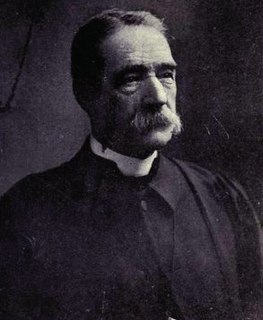
William Robinson Clark was a Scottish-Canadian theologian.
The Lord Almoner's Professorships of Arabic were two professorships, one at the University of Oxford and one at the University of Cambridge. They were both founded before 1724, but records of the holders of the chairs only date from that year. The professors were appointed by the Crown and their salaries were paid by the Crown by a grant to the Lord Almoner. The Crown ceased to appoint the professors in 1903.

Sir William Scovell Savory, 1st Baronet was a British surgeon.

Sir Hamilton Alexander Rosskeen Gibb (1895–1971), known as H. A. R. Gibb, was a Scottish historian on Orientalism.
John Wallis (1616–1703) was an English mathematician.

Hugh Fortescue, 3rd Earl Fortescue DL, known as Viscount Ebrington from 1841 to 1861, was a British peer and occasional Liberal Party politician.

Sir Henry Wentworth Dyke Acland, 1st Baronet, was an English physician and educator.
The Rt Rev. Piers Calveley Claughton, DD was an Anglican colonial bishop and author in the second half of the nineteenth century.
Joseph White (1745–1814) was an English orientalist and theologian, Laudian Professor of Arabic and then Regius Professor of Hebrew at the University of Oxford.
John Wallis was Laudian Professor of Arabic at the University of Oxford from 1703 until his death.
Thomas Winstanley was an academic at the University of Oxford, who held the positions of Camden Professor of Ancient History, Laudian Professor of Arabic, and principal of St Alban Hall.
Stephen Reay was a Scottish academic and clergyman, who was Laudian Professor of Arabic from 1840 until his death.
Gerard Jan Henk van Gelder FBA is a Dutch academic who was the Laudian Professor of Arabic at the University of Oxford from 1998 to 2012.
Thomas Hunt FRS was an English academic, who was Laudian Professor of Arabic at the University of Oxford from 1738 until his death.

Thomas Graham Balfour was a Scottish physician noted for his work with medical statistics, and a member of Florence Nightingale's inner circle.

Sir George Murray Humphry, FRS was a professor of physiology and anatomy at Cambridge, surgeon, gerontologist and medical writer.
William Hughes FRGS was an English geographer, mapmaker and author.
The Hon. Donald Mackenzie, Lord Mackenzie FRSE was a Scottish law lord who served as a Senator of the College of Justice in Edinburgh.










